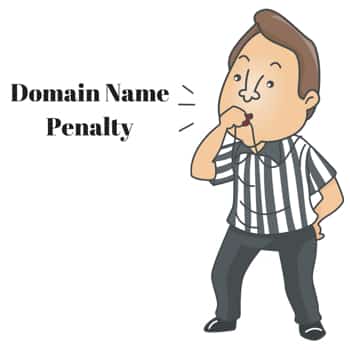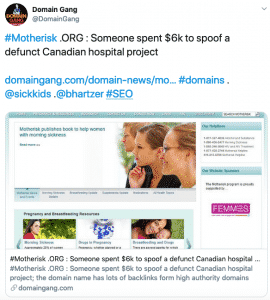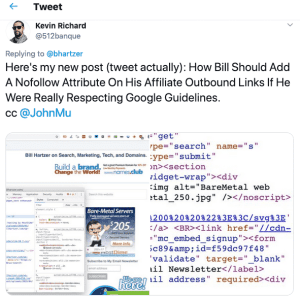When someone (or a company, organization) doesn’t renew a domain name, the domain name goes through a drop process. First the domain name usually enters a period of time when the current owner can renew the domain name. It’s essentially put on hold. It then enters a period (a certain number of days) when it’s marked as pending delete, and then, at one particular date and time, it is released to anyone who wants to register that domain name. The domain expiration process goes something like this:
- Domain name is not renewed by the registrant.
- Domain name enters the Renewal Grace Period.
- Renewal Grace Period ends. Domain is put on Registrar Hold.
- While on Registrar hold status, the registrar may try to sell the domain to the highest bidder (expired domain auction).
- Closeout sale: the Registrar may list it at a reduced price.
- Redemption period: when the domain name’s Registrar Hold ends, it is then released back to the Registry.
- End of registry grace period: the domain name goes to Pending Delete status for a certain number of days.
- Domain released / Domain drops: the domain name is available for anyone to register.
Several years ago, however, domain name registrars have decided to auction off the better, more sought-after domain names, even before they get to the pending delete stage of the process. These are referred to as the ‘expired domain auctions’. SEOs and those doing search engine optimization have learned that it’s typically lucrative for them to buy expired domain names and then use them for SEO purposes. I’ve written before about how to evaluate an expired domain name, and offer a domain name due diligence service to ensure a domain name you’re buying is “clean”.
Buying Expired Domains for Link Building
Expired domain names that had websites on them may have links pointing to them: buying an expired domain name and then redirecting it to a current website or using it for a new website can have some SEO benefits, as the search engines tend to combine the links and “ranking factors” from the expired domain name with the other domain name. So, one way SEOs have been using expired domain names is for link building: they buy domains with links and redirect, with a 301 Permanent Redirect, the domain name to another existing website. The domain name must be purchased before the domain name fully “drops”, as the registration “create date” does not change. This is important, as the search engines typically will give the redirected domain credit for the links that it has, and pass that on to the domain it’s being redirected to. If the domain name fully drops and the “create date” on the domain name’s WHOIS record is reset, typically all of the domain name’s links are reset, as well.
Buying Domain Names for Rebuild
One of the “black hat” (and possibly illegal) ways that some black hat SEOs take advantage of expired domain names is to actually rebuild the former website that was on that domain name. This (unfortunate) method, that totally throws any ethics out the window, is when someone will find a copy of the old website that used to be on a domain name and recreate or rebuild it. They’ll use the archive.org copy of the website and literally put the old website back up. They think that the search engines will potentially see the old website, see the links pointing to it, and continue to think that the website is now live again, and give SEO credit to the website. The new owner will then continue to host the website as if the former owner has it up again, and they will use it for links: they will add their own links to it, linking out to their own websites. An example of this is Mother Risk dot org, where someone bought the expired domain name and put the old website back up. There are all sorts of ethical issues with this that I don’t agree with. But, it’s a good example of a rebuild, nonetheless:
In this case, someone bought the expired domain name (the assumption is because of the links pointing to it) and rebuilt the website. The domain name is under WHOIS privacy. But, I believe that the web host should take down the website, as it’s an organization that no longer exists.
Buying Expired Domain Names for Redirects
As I mentioned previously, another thing that’s done is expired domain names are purchased for the links and then redirected to an existing website. This must be done when the domain name is on a domain name auction or in “pre-release” status, as a domain name that has completely expired will typically be reset by the search engines, and there won’t be any link value left on the domain name. Domains that are redirected typically should be redirected via a 301 Permanent Redirect to another page other than the home page of a website. If a domain name is redirected to the site’s home page, it can be treated as if it’s a “soft 404”, and links would not generally be counted by search engines for SEO purposes.
Buying Expired Domain Names for PBNs
PBNs are also known as Private Blog Networks. While the term includes “blog” in it, the sites aren’t necessarily blogs. In fact, it’s probably fairly rare that a PBN actually includes a blog, but some lesser-quality PBNs will include blogs. Essentially a PBN is a “network” of websites that link together, or it’s a network of websites owned by one person or one group/organization/company. They own the websites and they hide the fact that they own the websites. But, they use that network of websites to influence the search engine rankings by controlling which links each website is pointing to. Expired domain auctions are the main source of people buying and setting up PBNs.
Affiliate Insights Releases List of Domains
Affiliate Insights released a list of domain names that they’ve identified as being domain names used for PBNs, Redirects, or Rebuilds. All bought in 2019 from expired domain name auctions. They pulled the list from Namebio.com data, which is a websites that reports public domain name sales, usually through domain name auctions. In a Reddit post, they explained the data:
It’s a dataset of every expired domain purchased at auction for >$1000 in 2019 (per Namebio) that’s currently being used for SEO purposes as either a PBN, money site rebuild, or redirect.

Now that we have the list, and since it’s been made public, I wonder how long it will take for every one of these domain names to be reviewed by Google? The list of PBNs, for example, could be reviewed by Google employees, identified as a network of sites or sites that violate their guidelines, and then each website given a manual action (a search engine penalty).
Update 8/30/19: Affiliate Insights has removed the Google spreadsheet, so I removed the link from this post. I also removed the link to the Reddit post, as well. The original link to the Google spreadsheet was a “nofollow” link (I added the nofollow to it). Shortly after this was posted, Kevin Richard made a post, trying to “out me” as not having a nofollow link attribute added to my web host. I don’t know if there’s any connection, but the timing of this tweet and this post seems suspicious to me, as it was a response to a tweet about this post. I see this tweet as a threat or some sort of retaliation against me. I will not be intimidated. If the tweet is removed, here’s what Kevin Richard tweeted:
Update 9/3/19: Due to so many requests for the spreadsheet mentioned in this post, I’ve uploaded a copy of it to Google Drive and you can view or download it.
Update 7/20/20: I have removed the spreadsheet mentioned in this post.

